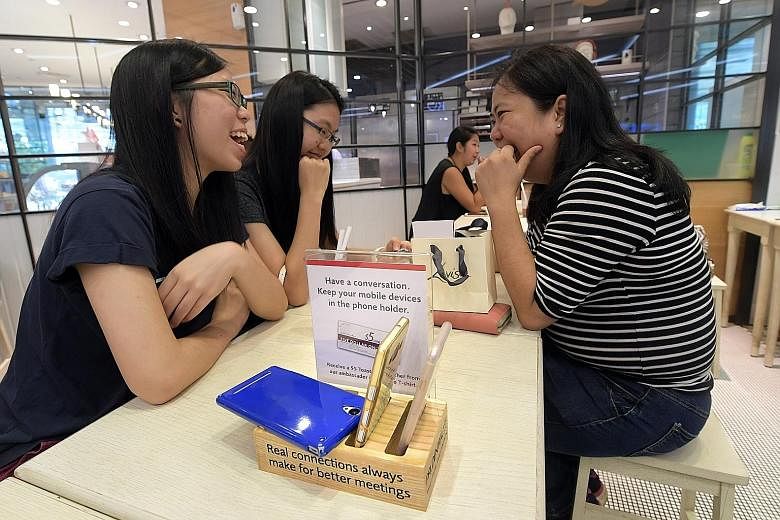Some customers at Toast Box outlets at Jem, Capital Square and Parkway Parade have been finding it just that bit easier to give their companions their undivided attention.
In exchange for leaving their phones in a phone holder on the table while they eat or drink, they receive a $5 Toast Box voucher.
The initiative, organised by Prudential Singapore and supported by Toast Box, aims to get people to talk to each other more. It started on Dec 13 and runs till today.
Public response has been positive.
Said Prudential Singapore's marketing head Harish Agarwal: "As the vouchers we allocate daily for this initiative get distributed within a few hours on some days, we have increased the number of vouchers by as much as 200 per cent depending on the location. "
Initially, 100 vouchers were given to each of the three outlets per day.
Mr Agarwal added that Prudential Singapore is very encouraged by the response and "will look for opportunities to take this initiative to more people in Singapore".
Ms Alene Ku, 19, who was at Toast Box in Jem on Saturday with her mother and sister, said it encouraged her to focus on the people she was with.
Said the Nanyang Technological University student: "When we have our phones with us, we keep checking them even if there isn't anything. Sometimes if I don't know what to say, I get bored and scroll through social media."
The effect is compounded when she hangs out with her friends.
"When I start using my phone, they see me using it and start using theirs too," she said.
Others are more sceptical.
Mr Ronald Tan, a 61-year-old retiree who eschews Facebook, Instagram and Twitter, said: "If not for the $5, no one would do it."
Mr Tan, who was enjoying coffee and a newspaper with his wife at Toast Box on Saturday, said: "Mobile phones are an addiction. In the old days, we had only a pager but we were happy with that."
This addiction comes from "the anticipation of something important", he said. "You always fear that someone is trying to contact you."
His misgivings are not unwarranted, if the 2016 Prudential Relationship Index is anything to go by. This shows how well people's current relationships measure against their desired relationships.
The study, which has a section on the impact of technology on relationships, polled 5,000 people in 10 Asian countries and territories - 500 in Singapore.
It found 22 per cent of respondents here at times preferred their phones to intimacy with their partner, while 32 per cent thought their partners sometimes preferred their mobile devices to being intimate.
Ten per cent admitted they "very frequently" sent messages to people in the same house, and more than a third (37 per cent) believed technology made it harder to have deep conversations.
Of those below age 30, 58 per cent spent more time messaging their friends than talking to them in person.
A key finding of Prudential's study is that Singapore ranks seventh out of 10 countries and territories in Asia for relationship satisfaction.
Respondents here were aged 25 to 55 and had monthly household incomes of at least $4,000.
Eighty-four per cent said they would consider "technology-free" days to improve their relationships - including 28 per cent who said they had done so before.
Said Prudential Singapore's chief customer officer Angela Hunter: "We need to be conscious of how we are using technology such that it becomes an enabler and not a disruptor of our relationships."
Also at Toast Box on Saturday were Mr Thomas Liew, 45, a chief financial officer, and Ms Michelle Kwa, 41, a director, who were chatting while their phones stood upright in the phone holder.
"I tried to put my phone face down in 'friend mode' before, but it didn't work that well... people are so used to using their phones," he said, referring to the 2013 Put It On Friend Mode campaign in Singapore that encouraged people to keep their mobile devices face down when with their friends.
Seeing the initiative at Toast Box is a reminder of the need to focus on face-to-face interactions, Mr Liew said. "We might start doing 'friend mode' again."
Still, it may be hard to completely switch off from technology.
Said Ms Kwa: "My phone beeped earlier, and he helped me read the message (off the screen)."



